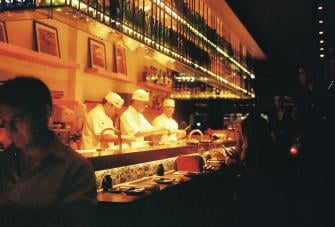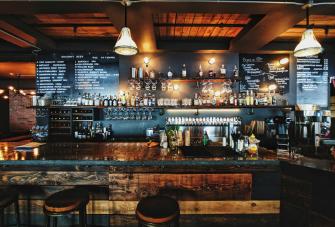How to Earn a Michelin Star
Most ambitious chefs will at some point dream about earning a coveted Michelin star. Not only does this achievement carry a high level of respect in the industry, but winning one will also be an enormous commercial boost for your venue.
What is a Michelin star?
A Michelin Star forms part of a global restaurant rating system from the Michelin Guide, which grades restaurants on their quality. For a restaurant to earn one Michelin star, the guide references them as “a very good restaurant”; two stars means “excellent cooking that is worth a detour”; and three stars is "exceptional cuisine that is worth a special journey".
History of the Michelin star
The famed Michelin Guide was created by the Michelin Brothers who owned a tire company in France. The brothers, André and Édouard, first printed the guide in 1900 and gave it away free.
Initially, the guide contained information about how to change a tire, maps, and where to find restaurants and gas stations. The aim was to promote the purchase of a vehicle by showcasing all the places one could go, which would lead to an increase in demand for (Michelin) tires.
In 1920, the guide was relaunched and cost seven francs. It started listing restaurants by categories, adding hotel listings, and removed advertisements. With the restaurant section growing in popularity, the brothers recruited a team to anonymously start reviewing the restaurants. In 1926, this rating system was graded by stars, and by 1931, they introduced the hierarchy of zero, one, two, and three stars. It wasn’t until 1936 that the criteria of the starred restaurant rankings were published.
Today, the Michelin Guide has expanded to over 30 territories spanning three continents. Restaurant inspectors still visit and review restaurants completely anonymously so that restaurants do not know they are in consideration for a Michelin star.
How to earn a Michelin Star
Firstly, Michelin only operates in certain regions, so to be in the running to earn a star, a restaurant must be located and operate in those specific regions.
Secondly, Michelin has strongly protected the anonymity of their inspectors for years, so you will never know when to expect one. They will not identify themselves and their meals and any expenses are all paid for by Michelin, not the restaurant. Many of the top executives at the company have never met an inspector, and they are advised to not disclose their work to anyone, including their parents.
The way to earn a star isn’t well known. Some chefs of restaurants who have been awarded stars have shared their experiences to help other restaurateurs. Tips to getting noticed by Michelin include having a meticulously clean kitchen, staff that pay high attention to detail, and a bias towards French-style dishes. Your restaurant will need to get noticed by the company, which can be accelerated by building a reputation with bloggers, food writers, and food publications.
During a seminar in Singapore in 2018, a panel of five food and beverage experts discussed the assessment criteria that Michelin inspectors use to rate their dining experience. The panel briefly discussed five different assessment criteria that local and international Michelin inspectors adhere to when rating restaurants.
These include:
- Using quality ingredients and products
- Master flavors and cooking techniques
- Showcasing the chef’s personality in the cuisine
- Value for money
- The overall consistency of the food and dining experience
Using Quality ingredients and products
Achieving a Michelin Star usually involves seeking out the best of the best ingredients. This could include going the extra mile to source ingredients directly instead of relying on an array of suppliers.
While the use of fresh produce and ingredients is essential when seeking the approval of the inspectors, it does not mean restaurants have to only use premium ingredients like truffles and turbot. It’s more about making the products sublime.
Master flavors and cooking techniques
Adopting a more practical approach when designing the dishes on the menu is important. They need to not only be aligned with the restaurant's identity but also be practical in the sense that they can be sustainable.
Alongside the quality of the products used, the cooking techniques also matter. Michelin starred restaurants need to pay high attention to detail all the way down to the kitchen-to-table serving time to ensure food arrives fresh.
Showcasing the chef’s personality in the cuisine
Chefs will generally have colorful personalities, so having this shine through the cuisine is another important factor. Also allowing this personality into the dishes will allow the restaurant to adopt an experimental culture that can prove worthwhile.
Value for money
Value for money can be interpreted in numerous ways, but what matters to Michelin inspectors is having an overall memorable experience. All restaurants, from casual to one-starred, should be focused on making sure their customers are happy and treated equally throughout the experience.
The overall consistency of the food and dining experience
Lack of consistency when it comes to both food served and the overall experience can attribute to the loss of a star. The reality of running a restaurant means there can be bad days when deliveries don’t arrive and staff don’t show up - this is why inspectors will visit two or three times before making a decision on rating.
The craftsmanship needed to create these dishes needs to not rely solely on the hands of one chef. That is why correct training with chefs and cooks is imperative to avoid inconsistencies in dishes.
After you earn a star
Once a restaurant earns its first star, media attention and a wave of new business are certain to come. However, this newfound success will also add a lot more pressure and can take an emotional toll on the cooks and chefs as they strive to maintain that level or aim to advance to two or three stars. The reality is that this can take years, even decades, so make sure the team is aware of this fact.
Alongside an influx of new customers, the star can also bring about a huge number of changes to your business. Everything in your restaurant will be under scrutiny and the customers may become more snobby during staff interactions. Line cooks may feel the pressure and operate more mechanically to ensure they maintain consistency. All these changes may mean restaurant owners need to offer raises or incentives to staff to help deter burnout and keep morale high.
If your aim is to earn a Michelin star for your establishment then it's best to understand the challenge it takes to get there and the problems with maintaining it. If you want help, contact our team who are well trained in hospitality to see how Epos Now can help you operate a standout restaurant.




